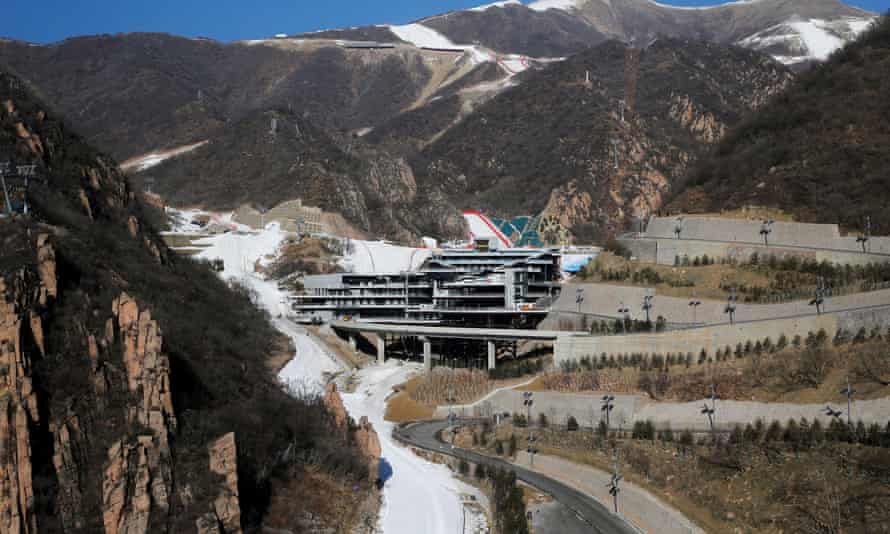The mountains that will be the setting of the Alpine events for the forthcoming Winter Olympics in Beijing boast spectacular scenery and breathtaking runs, but lack just one vital ingredient: real snow.
Between January and March this year, the National Alpine Ski Centre in Yanqing, about 55 miles north-west of Beijing, had just 2cm of snow. London, Paris and Madrid all recorded greater snowfalls, according to data compiled by the website worldweatheronline.com.
The International Olympic Committee (IOC) now faces mounting questions about the environmental cost of the Games, which open on 4 February, including claims the alpine runs were constructed in a protected nature reserve. It has been calculated that Beijing 2022 will need about 49 million gallons of water to create the required artificial snow.
“These could be the most unsustainable Winter Olympics ever held,” said Professor Carmen de Jong, a geographer at the University of Strasbourg. “These mountains have virtually no natural snow.”
She said artificial snow was water- and energy-intensive, damaging soil health and causing erosion.
IOC officials warned in the bid evaluation report in June 2015 that Yanqing, the venue for downhill skiing and slalom, and Zhangjiakou, the venue for cross-country skiing, ski jumping and snowboarding events, had meagre annual snowfalls. “[They] have minimal annual snowfall and for the Games would rely completely on artificial snow,” they said.
Stockholm, Oslo and Munich withdrew bids because of the costs, or failing to win public support.
About 200 snow cannons will create ribbons of artificial snow across the mountainside in Yanqing. A network of pipes and trenches will supply water from a reservoir to the snow-making machine.
While real snow is formed in clouds from clusters of tiny ice crystals, artificial snow is made from water droplets freezing into beads of ice. It typically means a harder piste and is often favoured by professional skiers for being fast and “hyper-grippy”.
It is not the first time the IOC has chosen an Alpine events venue with more rock than snow. It chose Pyeongchang, South Korea, for the last Winter Olympics, where the cold but similarly arid climate also required vast quantities of artificial snow.
Beijing has scarce water resources, but said in its bid there would be adequate supplies from stored run-off and existing reservoirs.
Justin Francis,a member of the UK government’s Council for Sustainable Business and chief executive of holiday firm Responsible Travel, said: “This is the world’s showcase of winter sport and it’s extraordinary to host it in a place dependent on artificial snow. The Olympics inspires us about sport, but also about doing our bit to sustain the planet. This is the ideal platform and it’s the wrong message.”
There are also concerns about the ecological impacts. The IOC evaluation report said the site would be adjacent to the 4,600 hectare Songshan National Nature Reserve, but in August 2015 the science journal Nature reported scientists’ concerns that the ski area fell within the park.
The journal highlighted an internet post by the scientist Wang Xi, from the Chinese Academy of Sciences, which included a map showing the start and end of the alpine runs within the protected reserve.
The post was reportedly clicked 240,000 times and forwarded more than 1,000 times before it no longer appeared online. A local mayor in Yanqing later said the park’s boundaries had been redrawn and none of the Olympic runs were in the extended nature reserve.
Beijing published its sustainability report for the Games last year, pledging to meet the goals set out in the UN’s 2030 Agenda for Sustainable Development. It said it would use renewable energy for the venues and recycle water resources. “We shall give priority to ecological and resource conservation, environmental friendliness, and contribute to a beautiful environment,” it said.
Richard Butler, emeritus professor in tourism at Strathclyde University, said: “The 2022 Olympics shows clearly how misused and now useless the term sustainable really is. It is used for whatever anyone wants and has become meaningless.
“Clearly money, power, influence and politics came together to award the games to an area without sufficient snow.”
Climate change means that ski resorts increasingly rely on artificial snow. According to a study by the Organisation for Economic Cooperation and Development (OECD) in 2007, global warming could jeopardise as many as two-thirds of all ski areas in the Alps. It warned of the impact on water supplies and local ecology in trying to use snow cannons to halt the retreating snowline.

Martin Bell, an Alpine skier who competed in four Olympics, said modern innovations helped ensure artificial snow was more environmentally friendly. “Snow-making is now part of the sport and you just have to make sure it’s done in a careful way,” he said. “As competitors, we would always love to race in the Alps with beautiful villages and the church bells ringing, but we understand the sport needs to spread and become a truly worldwide sport. And going to China will help.”
The IOC said: “Locations for Winter Games depend on a number of considerations, not just snowfall. A series of water-conserving and recycling designs have been put into place to optimise water usage for snowmaking, human consumption, and other purposes. Yanqing is rich in water resources in comparison with neighbouring areas.
“Beijing 2022’s mission is being green, open, inclusive and clean. Beijing 2022 will use renewable energy for all competition venues.”
The Beijing Organising Committee for the 2022 Olympic and Paralympic Winter Games did not respond to a request for comment.


